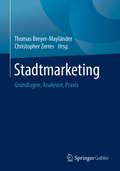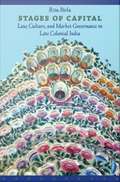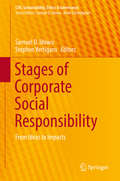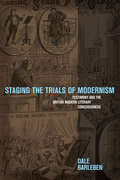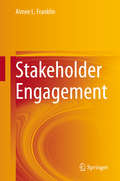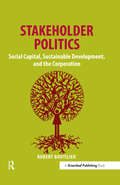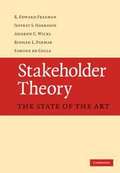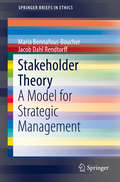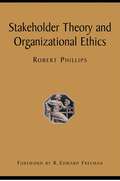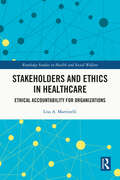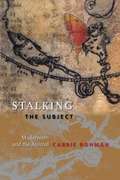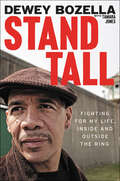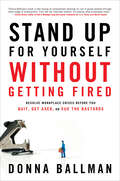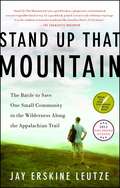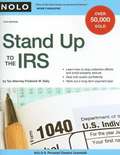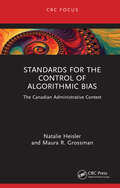- Table View
- List View
Stadtmarketing: Grundlagen, Analysen, Praxis
by Thomas Breyer-Mayländer Christopher ZerresStadtmarketing ist das Aufgabenfeld verschiedener Disziplinen und Berufsgruppen. Neben Marketingfachleuten aus Wissenschaft, Beratung und Praxis beschäftigt es auch Verwaltungsexperten oder Praktiker aus Handel und Gastronomie. Voraussetzung und Basis für erfolgreiche Marketingstrategien ist daher eine interdisziplinäre, konstruktive und flexible Zusammenarbeit aller Beteiligten. Dieses Buch gibt einen Überblick über die Grundlagen des Stadtmarketing und liefert Ansatzpunkte für die Weiterentwicklung von Städten, Kommunen und Regionen. Es beleuchtet die wichtigen Aspekte Transformation, Mobilität und Infrastruktur und bietet gezielte Anregungen für die Marketingpraxis. Zudem werden Beispiele erfolgreicher praktischer Umsetzungen aufgezeigt, wie etwa in Freiburg, Frankfurt, Neumünster, Offenburg, Jena, Mainz oder Leipzig.Über 40 renommierte Branchenexperten beschreiben, was die Branche bewegt und was es in Zukunft zu beachten gilt. Das Werk bietet Neulingen und Quereinsteigern aus anderen Fachgebieten sowie Studierenden großen Nutzwert. Außerdem enthält es wegweisende Anregungen für erfahrene Praktiker, die die Kommunikation und Kooperation mit Stakeholdern aus unterschiedlichen Fachdisziplinen verbessern möchten und zugleich nach Impulsen für die eigene Arbeit suchen.
Staged: Show Trials, Political Theater, and the Aesthetics of Judgment
by Minou ArjomandTheater requires artifice, justice demands truth. Are these demands as irreconcilable as the pejorative term “show trials” suggests? After the Second World War, canonical directors and playwrights sought to claim a new public role for theater by restaging the era’s great trials as shows. The Nuremberg trials, the Eichmann trial, and the Auschwitz trials were all performed multiple times, first in courts and then in theaters. Does justice require both courtrooms and stages?In Staged, Minou Arjomand draws on a rich archive of postwar German and American rehearsals and performances to reveal how theater can become a place for forms of storytelling and judgment that are inadmissible in a court of law but indispensable for public life. She unveils the affinities between dramatists like Bertolt Brecht, Erwin Piscator, and Peter Weiss and philosophers such as Hannah Arendt and Walter Benjamin, showing how they responded to the rise of fascism with a new politics of performance. Linking performance with theories of aesthetics, history, and politics, Arjomand argues that it is not subject matter that makes theater political but rather the act of judging a performance in the company of others. Staged weaves together theater history and political philosophy into a powerful and timely case for the importance of theaters as public institutions.
Stages of Capital: Law, Culture, and Market Governance in Late Colonial India
by Ritu BirlaIn Stages of Capital, Ritu Birla brings research on nonwestern capitalisms into conversation with postcolonial studies to illuminate the historical roots of India's market society. Between 1870 and 1930, the British regime in India implemented a barrage of commercial and contract laws directed at the "free" circulation of capital, including measures regulating companies, income tax, charitable gifting, and pension funds, and procedures distinguishing gambling from speculation and futures trading. Birla argues that this understudied legal infrastructure institutionalized a new object of sovereign management, the market, and along with it, a colonial concept of the public. In jurisprudence, case law, and statutes, colonial market governance enforced an abstract vision of modern society as a public of exchanging, contracting actors free from the anachronistic constraints of indigenous culture. Birla reveals how the categories of public and private infiltrated colonial commercial law, establishing distinct worlds for economic and cultural practice. This bifurcation was especially apparent in legal dilemmas concerning indigenous or "vernacular" capitalists, crucial engines of credit and production that operated through networks of extended kinship. Focusing on the story of the Marwaris, a powerful business group renowned as a key sector of India's capitalist class, Birla demonstrates how colonial law governed vernacular capitalists as rarefied cultural actors, so rendering them illegitimate as economic agents. Birla's innovative attention to the negotiations between vernacular and colonial systems of valuation illustrates how kinship-based commercial groups asserted their legitimacy by challenging and inhabiting the public/private mapping. Highlighting the cultural politics of market governance, Stages of Capital is an unprecedented history of colonial commercial law, its legal fictions, and the formation of the modern economic subject in India.
Stages of Corporate Social Responsibility
by Samuel O. Idowu Stephen VertigansThis book presents a multidisciplinary and multifaceted view of the state of corporate social responsibility (CSR) development in organizations in different industries around the world. It is based on the assumption that companies today must shift their focus to their long-term prosperity and the complex and interrelated environmental, social, economic and political ecosystems within which they function. The book tracks ideas through to impacts, offering unique perspectives on stimulating topics such as awareness among female entrepreneurs in Nigeria, views of upper-management in Polish firms, Japanese CSR strategies and the social relevance of corporate initiatives, pragmatic approaches of CSR design principles in Scandinavia and many more. The book collects not only examples from different countries and global regions, but also cases from a diverse range of globally relevant industries. It discusses the different stages of CSR development at a professional, conceptual and strategic level, and integrates them into a comprehensive framework to define the adequate course of action for each stage.
Staging the Trials of Modernism: Testimony and the British Modern Literary Consciousness
by Dale BarlebenIn Staging the Trials of Modernism, Dale Barleben explores the interactions among literature, cultural studies, and the law through detailed analyses of select British modern writers including Oscar Wilde, Joseph Conrad, Ford Madox Ford, and James Joyce. By tracing the relationships between the literature, authors, media, and judicial procedure of the time, Barleben illuminates the somewhat macabre element of modern British trial process, which still enacts and re-enacts itself throughout contemporary judicial systems of the British Commonwealth. Using little seen legal documents, like Ford's contempt trial decision, Staging the Trials of Modernism uncovers the conversations between the interior style of British Modern authors and the ways in which law began rethinking concepts like intent and the subconscious. Barleben’s fresh insights offer a nuanced look into the ways in which law influences literary production.
Stakeholder Engagement
by Aimee L. FranklinThis book analyses the relationship between stakeholder engagement practices and organizational sustainability across sectors and disciplines. It illuminates the relationships between the inputs and processes, vital for all kinds of organizations to engage stakeholders. Then, it describes the mutually-valued outcomes that can produce broader organizational impacts and sustainability. Each chapter is structured around a logic model that provides an analytical framework to engage the reader in strategic analysis and offer practical applications for adaptation and implementation in any organization. The book encourages the reader to systematically consider the descriptive, instrumental, and normative aspects of stakeholder theory as a precursor to designing stakeholder engagement practices.
Stakeholder Engagement Analyse: Eine Meso-Mikro-Makro-Analyse nachhaltigkeitsthemenorientierter Stakeholderkommunikation am Fallbeispiel Volkswagen AG (AutoUni – Schriftenreihe #153)
by Thomas LangAm Fallbeispiel der Volkswagen AG Nachhaltigkeit werden erstmalig auf der Grundlage eines sozialtheoretisch inspirierten Mehrebenen-Analysemodells die Wahrnehmungen und Zuschreibungen von Unternehmensverantwortung (Corporate Responsibility) durch 33 nichtmarktliche Stakeholder aus den drei Bezugsgruppen Wissenschaft und Forschung, Politik und Verbände sowie NGOs untersucht. Die qualitative Fallstudie beschreibt kenntnisreich und detailliert, wie der Volkswagen-Konzern mit seinen wesentlichen, nichtmarktlichen Stakeholdergruppen interagiert. Den theoretischen Bezugsrahmen der Arbeit bilden Anthony Giddens Theorie der Strukturation, Edward R. Freemans Stakeholder-Management- und Amartya Sens Capability-Ansatz.
Stakeholder Engagement and Innovation in Japan
by Hitoshi Takehara Megumi SutoThis book focuses on the linkage between corporate social responsibility (CSR) engagement and innovation strategies in the context of Japanese firms beginning in the late 2000s. Since that time, the firms have faced transformations in their business models and CSR activities in the face of global technological competition. The novelty of this book is that it carefully identifies the channels linking CSR and innovation through employee motivation for creativity and investor awareness of environmental, social, and governance (ESG) issues. As well, the book sheds light on the role of independent sustainability rating agencies as information intermediaries in this linkage. It empirically examines whether and how internal and external stakeholder engagement influences organizational innovation capability and the impact of ESG ratings on that relationship. This present work helps to provide a comprehensive understanding of the integration of multi-stakeholder engagement in corporate innovation strategies to survive in changing social and environmental circumstances, with insight into the role of information intermediaries in the integration process. The book has practical implications for strategic CSR to achieve social and environmental sustainability, which are particularly important in Japan.
Stakeholder Politics: Social Capital, Sustainable Development, and the Corporation
by Robert BoutilierThe war is over. The largest corporations in the world are now committed to sustainability. But, behind the public relations gloss, corporate executives and managers are perplexed. The majority of them have a genuine desire to work in an ethical and sustainable manner. Yet, when they engage with their stakeholders for that purpose, they unexpectedly encounter a world of hardball politics full of hostile activists, self-interested elites and unpredictable attacks. Unfortunately, corporate management is too often unskilled in this rough-and-tumble world. While managers rely on facts and rational analysis, their self-appointed critics have mastered the arts of political discourse, issue framing and media manipulation. At the same time, as corporations extend their global reach, their third-world stakeholder communities are beset with a variety of poverty-maintaining and sustainability-thwarting conditions. In many parts of the world, communities suffer from entrenched divisions, exclusion from power, unpredictable violence and economic dependency. In order to both reduce reputational risk and to contribute to sustainable development, companies need the equivalent of roadmaps of the socio-political terrain in their stakeholder networks.This book moves on to next challenge of giving companies what they need now: namely, "how to" guides addressing the twin problems of firstly maintaining political legitimacy (talking the talk), and, secondly, promoting sustainable development (walking the walk). They need to learn how to both play stakeholder politics and collaborate with stakeholders towards sustainability goals. Most companies have already encountered or anticipated the barriers that this book addresses, and managers will recognize the dilemmas described.Stakeholder Politics is the first book to offer a method for classifying and dealing with these socio-political problems.The book presents a typology of stakeholder networks that will help managers and community leaders identify and improve the social capital patterns in their own networks. Once they know what patterns they have, they can move their networks towards those that foster sustainable community development. The author describes vivid cases in which managers and community stakeholders have already used the approach successfully. At the same time, managers get handy tools for predicting and avoiding community-level socio-political risk around stakeholder issues: most notably, the Stakeholder 360 which has been successfully used in Canada and Australia with large groups of managers learning about stakeholder engagement.The book has been written for an audience of both managers and academics. Those working in developing countries with difficult stakeholder issues will find it indispensable.
Stakeholder Theory
by R. Edward Freeman Jeffrey S. Harrison Andrew C. Wicks Bidhan Parmar Simone De ColleIn 1984, R. Edward Freeman published his landmark book, Strategic Management: A Stakeholder Approach, a work that set the agenda for what we now call stakeholder theory. In the intervening years, the literature on stakeholder theory has become vast and diverse. This book examines this body of research and assesses its relevance for our understanding of modern business. Beginning with a discussion of the origins and development of stakeholder theory, it shows how this corpus of theory has influenced a variety of different fields, including strategic management, finance, accounting, management, marketing, law, health care, public policy, and environment. It also features in-depth discussions of two important areas that stakeholder theory has helped to shape and define: business ethics and corporate social responsibility. The book concludes by arguing that we should re-frame capitalism in the terms of stakeholder theory so that we come to see business as creating value for stakeholders.
Stakeholder Theory
by Jacob Dahl Rendtorff Maria Bonnafous-BoucherThis book provides an academic introduction to, and presentation and defence of stakeholder theory as a model for the strategic management of businesses and corporations, as well as of public organizations and institutions. The concept of the stakeholder is generally applied to parties that affect or are affected by the activities of private or public organizations. Distinct from shareholders, stakeholders are those individuals, entities or communities that have a connection with the activities of a corporation, a firm or an organization. The notion of the stakeholder is intimately linked to a conception of the business firm as an entity founded on negotiated governance, in which the maximization of value for the shareholder is not the ultimate criterion. In this model, issues and interests that are not directly associated with shareholders and investors, but which go beyond capital to encompass the concerns of civil society, are considered to be of central importance. This book provides a broad overview of stakeholder theory, presenting it as an ethical approach to strategic management that is both pragmatic and applicable to developing democratic practices within corporations, while at the same time suggesting ways in which elements of a social contract can be elaborated within the context of globalization.
Stakeholder Theory and Organizational Ethics
by Robert PhillipsPhillips (business, U. of San Diego) seeks to combine stakeholder theorydominant in organizational ethicswith the theories of John Rawldominant in political thought. Much of the material, he says, can be understood at least generally by anyone familiar with the stakeholder concept. Annotation (c)2003 Book News, Inc. , Portland, OR (booknews. com)
Stakeholder-Dialoge erfolgreich gestalten: Kernkompetenzen für erfolgreiche Konsultations- und Kooperationsprozesse
by Petra Künkel Silvine Gerlach Vera FriegEin Buch über Stakeholder-Dialoge und ergebnisorientiertes ZusammenarbeitenKaum ein Thema ist so omnipräsent wie Nachhaltigkeit. Die Menschen von heute sind dafür verantwortlich, die Zukunft für die Generationen von morgen positiv zu gestalten. In der Regel scheitert dieses Vorhaben jedoch an den unterschiedlichen Zielen, Ansprüchen und Werten der einzelnen Akteure. Dieses Buch widmet sich daher dem Thema Stakeholder-Dialoge. Denn nur, wenn sich ein ebenso kooperativer wie dialogorientierter Ansatz findet, ist ein kollektives Handeln möglich.Gemeinsame Lösungen für aktuelle Herausforderungen sind keine ZukunftsvisionenDieses Buch über Stakeholder-Dialoge bietet neben einem konzeptionellen Rahmen ebenfalls viele Fallbeispiele und methodische Ansätze, die zeigen, wie leicht Personen unterschiedlichen Hintergrunds effizient miteinander arbeiten können. Die Instrumente und Konzepte, die eine erfolgreiche Umsetzung versprechen, entstanden aus den Erfahrungen und Reflektionen der Mitwirkenden in diesem Buch. Stakeholder-Dialoge sind zwingend erforderlich, um das Thema Nachhaltigkeit ganzheitlich betrachten und angehen zu können. Durch die individuellen Ziele findet die Arbeit in der Regel voneinander isoliert und im gegenseitigen Wettstreit statt. Kooperationsprozesse zwischen Unternehmen aus der Wirtschaft und fachkundigen Experten unter einer gemeinsamen Führung sind der erste Ansatz, um zusammen Verantwortung zu übernehmen.Erfahren Sie in diesem Buch, wie Stakeholder-Dialoge und ein CSR-Management zusammenhängenDie aktualisierte Ausgabe umfasst folgende Kapitel, die Ihnen einen tiefen Einblick in die Materie geben:• Stakeholder Dialoge - ein zentraler Ansatz zur Umsetzung nachhaltiger Entwicklung• Potenzialanalyse für die Anwendung von Stakeholder Dialogen• Formen von Stakeholder Dialogen und die Möglichkeit ihrer Umsetzung• Die Durchführung von Stakeholder Dialogen• Stakeholder Dialoge als Veränderungsmanagement• Kommunikation in Stakeholder Dialogen• Dialog als Grundprinzip von Konsultation und Kooperation• Erfolgsfaktoren für Stakeholder Dialoge• Prozessmonitoring in Stakeholder Dialogen• PraxistoolsDie einzelnen Teile des Buches sollen Ihnen dabei helfen, mittels Stakeholder-Dialogen den existierenden Status-Quo zu ändern.
Stakeholders and Ethics in Healthcare: Ethical Accountability for Organizations (Routledge Studies in Health and Social Welfare)
by Lisa A. MartinelliThis ground-breaking book uses organizational ethics and stakeholder theory to explore the ethical accountability of leadership in healthcare organizations to their distinct vulnerable stakeholder communities. The book begins with a discussion of the moral agency of healthcare organizations and introduces stakeholder theory. It then looks at key ethical challenges in relation to the confidentiality and privacy of health care data, before turning to child health and interventions around issues such as obesity, maltreatment, and parenting. The book ends by focusing on ethics of care in relation to older people and people with disabilities. An insightful contribution to thinking about ethics for contemporary healthcare management and leadership, this interdisciplinary book is of interest to readers with a background in healthcare, business and management, law, bioethics, and theology.
Stakeholders and Scientists
by Joanna BurgerNation and the World must move forward with development of a range of energy sources and savings, all with attendant environmental problems. Solving these problems, and those remaining from past energy-related activities, will require iteration, inclusion, and collaboration with a wide range of stakeholders, including U.S., State and local governmental agencies, Tribal Nations, scientists, environmentalists, public policy makers, and the general public.
Stalking Crimes and Victim Protection: Prevention, Intervention, Threat Assessment, and Case Management
by Joseph A. DavisAlthough stalking is an age-old phenomenon, it is only recently receiving due attention. In a span of just ten years, all fifty states have passed anti-stalking legislation. For the first time, Stalking Crimes and Victim Protection: Prevention, Intervention, Threat Assessment, and Case Management brings together in one source all the research done
Stalking the Subject: Modernism and the Animal
by Carrie RohmanHuman and animal subjectivity converge in a historically unprecedented way within modernism, as evolutionary theory, imperialism, antirationalism, and psychoanalysis all grapple with the place of the human in relation to the animal. Drawing on the thought of Jacques Derrida and Georges Bataille, Carrie Rohman outlines the complex philosophical and ethical stakes involved in theorizing the animal in humanism, including the difficulty in determining an ontological place for the animal, the question of animal consciousness and language, and the paradoxical status of the human as both a primate body and a "human" mind abstracting itself from the physical and material world. Rohman then turns to the work of Joseph Conrad, D. H. Lawrence, H. G. Wells, and Djuna Barnes, authors who were deeply invested in the relationship between animality and identity. The Island of Dr. Moreau embodies a Darwinian nightmare of the evolutionary continuum; The Croquet Player thematizes the dialectic between evolutionary theory and psychoanalysis; and Women in Love, St. Mawr, and Nightwood all refuse to project animality onto others, inverting the traditional humanist position by valuing animal consciousness. A novel treatment of the animal in literature, Stalking the Subject provides vital perspective on modernism's most compelling intellectual and philosophical issues.
Stand Tall: Fighting for My Life, Inside and Outside the Ring
by Tamara Jones Dewey BozellaThe inspiring story of one man’s fight against his wrongful incarceration and his eventual triumph—both inside and outside the boxing ring.In the late 1970s, Dewey Bozella was wrongfully convicted of murdering Emma Crapser, a ninety-two-year-old resident of Poughkeepsie, New York. Sentenced to twenty years to life in prison, Bozella fiercely maintained his innocence throughout his ordeal at Sing Sing Correctional Facility, and even refused the prosecutor’s offer of freedom in exchange for an admission of guilt. But in 2009, more than a quarter century later, Dewey Bozella would reclaim his identity and his humanity when his conviction was vacated.In this raw and uplifting memoir, Bozella takes us through the trials, tribulations, and joys of his life inside prison and, eventually, as a free man. While at Sing Sing, he took up boxing to channel his anger, and eventually became the prison’s light-heavyweight champion. Bozella also met and married the love of his life from behind bars, lost countless parole hearings, and spent agonizing time on a cell block with both his brother’s murderer and, it turned out, the true crim-inal in whose place Bozella served so much time. But Bozella never gave up. After he was refused parole and had his sentence extended, the Innocence Project caught word of his case. Thanks to his undying faith, stalwart persistence, and the aid of a young pro bono attorney at the Innocence Project who doggedly worked toward Bozella’s release when all hope seemed lost, he was released from prison in 2009. Shortly thereafter, he won his professional boxing debut against Larry Hopkins, started an afterschool athletics program for at-risk youth, and was awarded the Arthur Ashe Award for Courage.An incredibly uplifting underdog story, Stand Tall recounts one man’s perseverance in the face of injustice and his difficult road to freedom.
Stand Up For Yourself Without Getting Fired: Resolve Workplace Crises Before You Quit, Get Axed, or Sue the Bastards
by Donna BallmanTake a deep breath and learn how to deal with a bad work situation: “Like having an employment attorney on call. . . . It’s exactly what employees need.” —Alison Green, author of Ask A ManagerUSA Best Book Award WinnerHate your job? Ready to quit? Facing a layoff before you even have a chance to quit? Is your boss is a flaming jerk? Think you might have a lawsuit? If any of these scenarios apply to you, you are facing a crucial career moment—and mistakes and misinformation will cost you dearly.In Stand Up for Yourself Without Getting Fired, celebrated attorney Donna Ballman provides winning answers to these and many more tough questions, such as:I think they’re getting ready to lay me off. What can I do?My boss is creating a hostile environment. Can I sue?What does it mean if I sign a paper saying I’m an independent contractor and not an employee?Am I exempt from overtime?Whether you’re a recent college grad or an almost-retiree, newly employed or laid off after twenty years; gay or straight; single or married with kids; janitor or CEO . . . Stand Up for Yourself Without Getting Fired will give you the specific and relevant advice you need to face any career-threatening situation . . . and come out ahead.
Stand Up That Mountain
by Jay Erskine LeutzeIn the tradition of A Civil Ac tion--the true story of a North Carolina outdoorsman who teams up with his Appalachian "mountain people" neighbors to save treasured land from being destroyed Living alone in his wooded mountain retreat, Jay Leutze gets a call from a whip-smart fourteen-year-old, Ashley Cook, and her aunt, Ollie Cox, who say a mining company is intent on tearing down Belview Mountain, the towering peak above their house. Ashley and her family, who live in a little spot known locally as Dog Town, are "mountain people," with a way of life and speech unique to their home high in the Appalachians. They suspect the mining company is violating the law, and they want Jay, a nonpracticing attorney, to stop the destruction of the mountain. Jay, a devoted naturalist and fisherman, quickly decides to join their cause. So begins the epic quest of the "Dog Town Bunch," a battle that involves fiery public hearings, clandestine surveillance of the mine operator's activities, ferocious pressure on public officials, and high-stakes legal brinksmanship in the North Carolina court system. Jay helps assemble a talented group of environmental lawyers to do battle with the well-funded attorneys protecting the mining company's plan to dynamite Belview Mountain, which happens to sit next to the famous Appalachian Trail, the 2,184-mile national park that stretches from Maine to Georgia. As the mining company continues to level the forest and erect a gigantic rock-crushing plant on the site, Jay's group searches frantically for a way to stop an act of environmental desecration that will destroy a fragile wild place and mar the Appalachian Trail forever. Much more than the record of a legal battle, Stand Up That Mountain takes the reader to a remote corner of Appalachia, a region often stereotyped and little understood, even now in the twenty-first century. A naturally elegant writer, Jay Leutze delivers a powerful, beautifully written story full of remarkable characters, such as "Wingfoot," an elusive protector of the Appalachian Trail; a stubborn mining company engineer intent on pulling down the mountain in the face of intense opposition; and Ron Howell, a retired and legendary North Carolina Superior Court judge known as the "Heel Hound" for his relentless pursuit of legal victory. Jay's plaintiff group is eventually joined by several national conservation groups who see that Belview Mountain and the Appalachian Trail must be protected for future generations of Americans. A great contemporary story that demonstrates what is possible when local people set their minds to righting a local wrong, Stand Up That Mountain will appeal to conservationists, hikers, attorneys, and readers fascinated by Appalachia and rural life, and anyone interested in a compelling story both well told and true.
Stand Up to the IRS
by Frederick W. Daily AttorneyIRS Bills? Get the information and strategies you need to deal with the taxman. Named a "Best Tax Book" by Entrepreneur.com The Internal Revenue Service is the taxpayer's worst nightmare, and for good reason -- a tax bill or other notice can come out of nowhere and wreak havoc on your life. But now you can confront America's most intimidating government agency with confidence. Stand Up to the IRS reveals the tactics used by IRS and how to deal with them. This book even contains confidential forms used by IRS agents during collection interviews and audits. Use Stand Up to the IRS to: file a late return work out a long-term payment plan get a Taxpayer Assistance Order settle your tax bill for pennies on the dollar stop collection efforts avoid property seizures protect your assets determine if bankruptcy offers a solution learn what to say when you face an auditor appeal the auditor's decision This edition is completely updated with the latest rules, regulations and tax numbers. Plus, Stand Up to the IRS also shows you how to go to Tax Court, if it's ever needed.
Stand Up to the IRS (10th edition)
by Frederick W. DailyDaily, an attorney with 30 years of experience in tax law, reveals tactics of the Internal Revenue Service and tells how to deal with them. He explains procedures for filing a late tax return, working out a long-term tax payment plan, getting a Taxpayer Assistance Order, protecting assets, and avoiding property seizures. He provides forms used by IRS agents during collection interviews and audits, and provides information and forms for Tax Court so that readers can represent themselves in cases involving less that $50,000. Annotation ©2004 Book News, Inc., Portland, OR (booknews.com)
Stand Your Ground: A History of America's Love Affair with Lethal Self-Defense
by Caroline LightA history of America’s Stand Your Ground gun laws, from Reconstruction to Trayvon MartinAfter a young, white gunman killed twenty-six people at Sandy Hook Elementary School in Newtown, Connecticut, in December 2012, conservative legislators lamented that the tragedy could have been avoided if the schoolteachers had been armed and the classrooms equipped with guns. Similar claims were repeated in the aftermath of other recent shootings—after nine were killed in a church in Charleston, South Carolina, and in the aftermath of the massacre in the Pulse nightclub in Orlando, Florida. Despite inevitable questions about gun control, there is a sharp increase in firearm sales in the wake of every mass shooting.Yet, this kind of DIY-security activism predates the contemporary gun rights movement—and even the stand-your-ground self-defense laws adopted in thirty-three states, or the thirteen million civilians currently licensed to carry concealed firearms. As scholar Caroline Light proves, support for “good guys with guns” relies on the entrenched belief that certain “bad guys with guns” threaten us all.Stand Your Ground explores the development of the American right to self-defense and reveals how the original “duty to retreat” from threat was transformed into a selective right to kill. In her rigorous genealogy, Light traces white America’s attachment to racialized, lethal self-defense by unearthing its complex legal and social histories—from the original “castle laws” of the 1600s, which gave white men the right to protect their homes, to the brutal lynching of “criminal” Black bodies during the Jim Crow era and the radicalization of the NRA as it transitioned from a sporting organization to one of our country’s most powerful lobbying forces.In this convincing treatise on the United States’ unprecedented ascension as the world’s foremost stand-your-ground nation, Light exposes a history hidden in plain sight, showing how violent self-defense has been legalized for the most privileged and used as a weapon against the most vulnerable.
Standard-Setting Organisations’ IPR Policies: Intellectual Property and Competition Issues
by Manveen SinghThis book offers a unique insight into the world of standard-setting organizations (SSOs)’ IPR policies and the role they play in balancing the interests of innovators and implementers, vis-à-vis the development of standards. Since the beginning of the 21st century, there have been quite a few questions asked of the SSOs as to the legality of their IPR policies and the enforceability of disclosure and licensing obligations enshrined therein. That, coupled with disagreements over the appropriate royalty rate and royalty base, has resulted in extensive litigation between innovators and implementers, especially across the Atlantic. The Book, in keeping the USA and EU as the two primary jurisdictions, offers a comprehensive analysis of the disclosure and licensing obligations under SSO IPR policies, with strong theoretical foundations justifying their imposition. More specifically, it offers a bird’s eye view of the various facets of disclosure and licensing, ranging from non-disclosure and transparency on one hand, to the determination of FRAND on the other. While much has been said about the benefits arising out of collaborative standard-setting, disputes involving SEP licensing have not been limited to the courts, and have attracted a significant amount of scrutiny by competition/antitrust agencies. The Book provides an elaborate account of the anti-competitive concerns surrounding standard-setting, and further documents the role of courts and competition agencies in ensuring good faith licensing negotiations between the SEP holders and implementers. Despite largely focusing on SEP licensing disputes in the USA and EU, the Book also offers a dedicated chapter on standard-setting in the Indian context. The readers are presented with an in-depth discussion on the contrasting approaches adopted by the courts and the Competition Commission of India (CCI), in addressing disputes involving SEPs. The said discussion is supplemented by a careful analysis of the SEP licensing guidelines to have emerged out of other implementer-oriented economies like China and Japan. By doing so, the Book offers readers the opportunity to study and compare the SEP licensing framework in developed, as well as developing economies. SSO IPR policies play an integral role in the development of standards, and with technologies such as the Internet of Things and 5G knocking on the doors, the Book makes for a valuable study on the nuances of standard-setting through the lens of SSOs, and will find takers among a wide reader base of students, researchers, academics, law practitioners, corporates, and policy makers.
Standards for the Control of Algorithmic Bias: The Canadian Administrative Context
by Natalie Heisler Maura R. GrossmanGovernments around the world use machine learning in automated decision-making systems for a broad range of functions. However, algorithmic bias in machine learning can result in automated decisions that produce disparate impact and may compromise Charter guarantees of substantive equality. This book seeks to answer the question: what standards should be applied to machine learning to mitigate disparate impact in government use of automated decision-making? The regulatory landscape for automated decision-making, in Canada and across the world, is far from settled. Legislative and policy models are emerging, and the role of standards is evolving to support regulatory objectives. While acknowledging the contributions of leading standards development organizations, the authors argue that the rationale for standards must come from the law and that implementing such standards would help to reduce future complaints by, and would proactively enable human rights protections for, those subject to automated decision-making. The book presents a proposed standards framework for automated decision-making and provides recommendations for its implementation in the context of the government of Canada’s Directive on Automated Decision-Making. As such, this book can assist public agencies around the world in developing and deploying automated decision-making systems equitably as well as being of interest to businesses that utilize automated decision-making processes.
